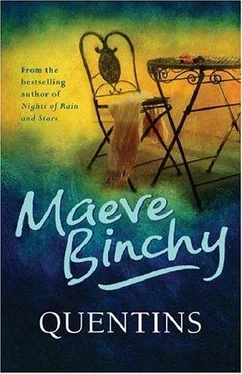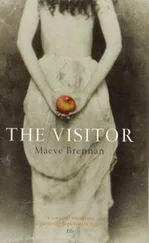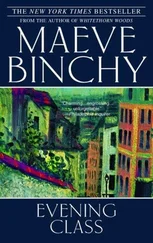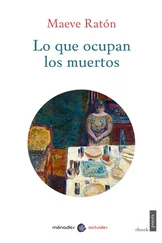Maeve Binchy - Quentins
Здесь есть возможность читать онлайн «Maeve Binchy - Quentins» весь текст электронной книги совершенно бесплатно (целиком полную версию без сокращений). В некоторых случаях можно слушать аудио, скачать через торрент в формате fb2 и присутствует краткое содержание. Жанр: Современная проза, на английском языке. Описание произведения, (предисловие) а так же отзывы посетителей доступны на портале библиотеки ЛибКат.
- Название:Quentins
- Автор:
- Жанр:
- Год:неизвестен
- ISBN:нет данных
- Рейтинг книги:5 / 5. Голосов: 1
-
Избранное:Добавить в избранное
- Отзывы:
-
Ваша оценка:
- 100
- 1
- 2
- 3
- 4
- 5
Quentins: краткое содержание, описание и аннотация
Предлагаем к чтению аннотацию, описание, краткое содержание или предисловие (зависит от того, что написал сам автор книги «Quentins»). Если вы не нашли необходимую информацию о книге — напишите в комментариях, мы постараемся отыскать её.
Quentins — читать онлайн бесплатно полную книгу (весь текст) целиком
Ниже представлен текст книги, разбитый по страницам. Система сохранения места последней прочитанной страницы, позволяет с удобством читать онлайн бесплатно книгу «Quentins», без необходимости каждый раз заново искать на чём Вы остановились. Поставьте закладку, и сможете в любой момент перейти на страницу, на которой закончили чтение.
Интервал:
Закладка:
Best not to question good news, Patrick always believed, like the look of love and huge relief in Brenda's eyes as she reached out her hand and stroked his through the most extraordinary - and successful - evening that Quentins had known so far.
When Brenda's great friend Nora had lived all those years in Italy, she had written long, long letters. Always she began with the word "Carissima" ... It sounded a bit fancy, Brenda thought, a little over the top, but Nora had insisted. She spoke Italian, she dreamed Italian now. To say "Dear Brenda" would sound flat and dull.
Carissima .. . dearest . .. was a better way to begin.
And Brenda wrote back faithfully. She charted a changing Ireland for her friend, for Nora who lived in the timeless Sicilian village of Anninziata. Brenda wrote how the waves of emigration were halted, how affluence came gradually to the cities, how the power of the Church seemed to slip away and change into something entirely different.
Brenda wrote that young people from different lands came to find work in Ireland now, girls who found themselves pregnant kept their babies instead of giving them up for adoption, young couples lived together for six months or a year before their marriages.
Things that were unheard of when Brenda and Nora were young.
Nora wrote about her friends in this village. The young couple who rented the pottery shop. Signora Leone. And of course Mario.
Mario, who ran the hotel.
Nora never wrote of Mario's wife Gabriella or their children. But that was all right. Some things were too huge to write about.
Brenda wrote about a lot of things, how she had met this guy they used to call Pillowcase, but was most definitely called Patrick Brennan these days, how they had fallen in love and worked in many restaurants. She told how the good fortune of running Quentins had fallen into their lap and they were rapidly making a great name for themselves. She wrote about the people who came and went, staff, and those like Patrick's brother Blouse, who had stayed and flourished there.
But Brenda only once told the deepest secrets of her soul, their great wish to have children, the long, often humiliating and eventually disappointing road of fertility guidance. That was too hard to write about.
Brenda was very helpful in that she acted as a spy for Nora O'Donoghue by going to see Nora's family. Hard, unforgiving people, who regarded her as a sinner and a fool, someone who had disgraced them by running off after a married man.
They were so uncaring about Nora's life that Brenda urged her friend to forget them. "They have forgotten you unless it suits them," she had written to Sicily. "I beg you, don't listen to any pleas they may have when they are older that you should return and be their nurse."
"Carissima," Nora had written, "I will never leave this place while there is a chance that I can see my Mario. I wish they could share my happiness. But perhaps one day they will be able to."
Nora's Mario died, killed in an accident on the mountain roads which he drove across so fast. The village implied that the Signora Irlandese should now leave and go home.
Brenda would never forget the day Nora had appeared at Quentins, long dress, wild hair, her face mad with grief for the only man she had ever loved. She still called Brenda "Carissima". They were still best friends. The long years apart, well over two decades, had changed nothing between them.
And when Nora found a new love, Aidan, the teacher up in Mountainview School, she and Brenda clutched each other like teenagers. Til dance at your wedding," Brenda promised.
"Hardly, there is the little problem of his first "wife," Nora had giggled.
"Come on, Nora, drag yourself to the present day ... there is divorce since 1995."
I managed for well over twenty years without marriage first time round. I can do it again." Nora wasn't asking for the moon and stars. "You do what you like, but I'm not giving up on it," Brenda threatened. Patrick said that it was amazing they found so much to talk about. He was never jealous of their friendship, but often said that men just didn't have conversations like that about every single aspect of life. "You are the losers," Brenda said. "I agree, that's what I'm saying," Patrick said unexpectedly. Nora went every week to the hospital where her elderly father lived in the geriatric ward. Ram or shine she wheeled him in the grounds. Sometimes he smiled at her and seemed pleased, other times he just stared ahead. She told him about any happy things that she remembered about her childhood. Often these were difficult to dredge up. She didn't tell him about Sicily because already it was fading in her mind like a highly coloured photograph left in bright sunlight. So she told him about Aidan Dunne and Mountainview School and the Italian classes. And she talked pleasantly about her sisters Rita and Helen, and her large!} silent brothers, even though she hardly saw them at all.
The news that she had moved into a bed-sitting-room with a married Latin teacher had horrified them all over again. Really, Nora seemed to be a scourge sent to lash their backs.
Nora called to see her mother every week. Age had not improved her mother's temper or attitude, but Nora was determined to remain calm. Years of practice had given her a skill at being passive. And it was easy to call in for an hour and listen to her mother's list of complaints if she could go back on the bus to good, kind Aidan, who was so different and saw nothing bad in the world. The day of her father's funeral was bleak and wet. Brenda and Patrick came but they decided against letting Aidan take part. He might be like a red rag to a bull. Some of her students from the Italian class came to the church, an odd little group which certainly helped to boost the numbers. "I'd ask you back, but I don't honestly think that my mother would be able to . . .". No, no, they insisted, they had just wanted to pay their respects. That was all. Nora's mother found fault with everything. The priest had been too young, too swift, too impersonal. People hadn't worn dark clothes. The hotel they had gone to for coffee, just the family, had been entirely unsuitable.
She brooked no conversation at all about Father. Did not care to hear that he had been a kind man and that it was good that he was at peace. Instead there was a litany of his mistakes which were apparently legion and the main one was his never having taken out a proper insurance policy.
"And now of course you'll all go off to your own homes and leave me alone for the rest of my days," she said.
Nora waited for the others to speak. One by one they did. They told Mother that she was in fine health, that a woman in her seventies was not old these days. They reminded her that her flat was very convenient for bus stops, shops and the church. They said that they would all come to see her regularly and now that there was no longer a matter of visiting Father, they would take her on different outings.
Their mother sighed as if this was not nearly enough. "You only come once a month," she said.
This was news to Nora. It had always been implied that the visits from her sisters and sisters-in-law were much more frequent. It meant then that she, with her weekly visit, was indeed the best of them all.
She noted it without allowing her face to change.
Rita and Helen were quick to explain. They were so busy and, honestly, others must remember how hard it was with families and running proper homes.
The implication was that Nora had all the time in the world and no responsibilities so should play nursemaid and be glad to do so. Nora, who worked harder than any of them, Nora, the only one of them without a car who did the awkward shopping, and visited four times as often as the others did, always bearing something she had cooked for her mother.
Читать дальшеИнтервал:
Закладка:
Похожие книги на «Quentins»
Представляем Вашему вниманию похожие книги на «Quentins» списком для выбора. Мы отобрали схожую по названию и смыслу литературу в надежде предоставить читателям больше вариантов отыскать новые, интересные, ещё непрочитанные произведения.
Обсуждение, отзывы о книге «Quentins» и просто собственные мнения читателей. Оставьте ваши комментарии, напишите, что Вы думаете о произведении, его смысле или главных героях. Укажите что конкретно понравилось, а что нет, и почему Вы так считаете.






